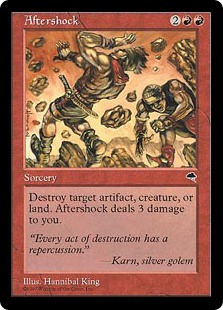As anyone who has ever built their own Commander deck can attest, nailing down exactly which 99 cards to use can be tricky. With a minimum of 33 land, the actual number of available card slots plummets to 66. Sixty-six cards to define what it is the deck is supposed to do and to actually make it work. Each card in the deck therefore has to accentuate the deck in some way, be it mechanically, thematically, or even flavorfully. (And yes, it is perfectly acceptable to have cards in an EDH deck for flavor reasons.) The cards themselves essentially have to go through a job interview for those precious few available positions, and the player has to weigh who the most qualified candidates are.
The more versatile and multifaceted the card is, the more appealing of a case it makes. Utility cards such as charms, commands, and multifunction tools usually make their way into a deck for precisely that reason. However, as resourceful as those cards may be, they still have to fit into the confines of what the card’s color(s) can do. A Green charm isn’t going to make a player discard cards, and a Black one isn’t going to be destroying enchantments. There are just some things that colors can’t do, and as frustrating as that can be sometimes, in general it’s actually a good thing.
It’s especially frustrating when a color is theoretically able to do something close to what you want, but can’t. This comes up with Harmonize a lot, for example. Green has been given the ability in recent years to draw cards via creatures, but R&D says Harmonize was largely considered a mistake. (A mistake they’ve reprinted five times all the same.) Still, you will never get a Green creature to simply tap and draw a card – and Magus of the Library doesn’t count.
This also comes up a lot with Red. Red may be doing well in the Constructed scenes, but from a casual and Commander perspective, monored has issues to contend with. For instance, even though its potency has been lessened overall, Red is still supposed to be the primary color in land destruction, and yet you’ve probably seen far more instances of Mold Shambler, Acidic Slime, Terastodon or Sylvan Primordial than someone running a Demolish – today’s Stone Rain.
What’s more, with the ability moved out of White years ago, Red is supposed to be the only color of mass land destruction. However, the last unencumbered land wipe card was in Planar Chaos with Bust. The only cards since then have been Destructive Force (a more expensive Wildfire), Ember Swallower (which is even less efficient), and From The Ashes (which only affects nonbasic land). For a color with land destruction as one of its abilities, its options in the seven years since Bust have become less useful while Green’s “destroy noncreature permanent” ability sees far more play.
That all said, I’m not actually advocating for a flood of new land destruction cards by any means. I’m more interested in Red’s other primary ability that could use some help in the Commander environment: killing creatures. To do that, we need to go farther back than the Time Spiral block. Much farther.
Today we have: Aftershock

Name: Aftershock
Edition: Tempest
Rarity: Common
Focus: Artifact Destruction / Creature Destruction / Land Destruction
Highlights: Aftershock is the type of utility card that monored Commander decks wish they had more access to. It costs the same as a Demolish, except that it’s adding the ability to destroy a creature at the cost of taking three damage. It may not be worth it for gunning down a 2/2 token, but considering some of the massive creatures the format sees, it’s well worth the cost.
That’s the issue at heart, really. EDH sees higher life totals and far bigger creatures on average than a normal game. Red has long lost the ability to actually destroy a creature flat out; that’s solely Black’s territory nowadays. Instead, the logic goes, that Red should be able to destroy a creature by doing damage. Admittedly, doing damage to a creature is much more fitting flavor wise in Red than just nixing it most of the time, and most of the time it isn’t a huge issue. So, it’s pretty sound logic.
Except if the creature is huge, that is. Supposedly, one of Red’s ‘issues’ is the inability to deal with large creatures. Small armies, sure. Medium armies, alright. But one giant titan? Unless you have a hoard of dragons waiting around, your option is to shift to doing damage to the player (if you haven’t been already). The rebuttal is usually to kill the player and the creature will go away. Unfortunately, that approach doesn’t scale well when everyone starts at twice the normal life totals. Monored could use some help in this regard, and Aftershock is that kind of answer. Aftershock, just like damage spells, has zero impact on a creature with Indestructible or Protection from Red, but it could give Red a hand in a format that makes it difficult to be itself.
Is Aftershock out of the modern color pie? Most assuredly. But given that red has the hardest time scaling to Commander-style games, having some way of addressing the multitude of creatures that exist well out of burn range, it still embodies Red’s identity without letting the color do something it’s not supposed to.
And it’s still far less of an issue than Chaos Warp.
Keep an eye out for us to be regularly featuring other more accessible-but-worth-it Commander cards going forward. In the meantime, we’ll keep the light on for you.
![]()
You can discuss this article over on our social media!
Do you have a particular Commander card to suggest for us to shine a future Spotlight on? You can send suggestions to ryan@cardboardrepublic.com
